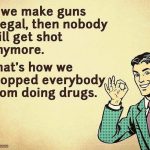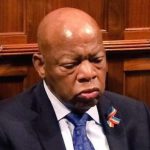In the wake of the horrific Oregon shooting a few weeks ago each side in the pro-gun/anti-gun debate engaged in a kind of holiday-esque ritual: unbox one’s standard talking points, adorn social media and the press with said arguments for a week or two, and then when the furor has died down quietly pack them back up for the next gun-related incident. The problem with the standard talking points is that although they may resonate with the owner, they do little to sway the opinion of the opposing side. They have become stale and useless.
Government prohibitions of market transactions do nothing to eliminate those transactions. Prohibition raises their costs and consequently the profit potential. This induces more, not fewer, people to ply that trade. Decentralized markets are the most efficient means of delivering to people the goods and services they want. People do not want themselves or anyone else to die a violent death. Let’s see if the market can provide this good. Since it is the left’s position that our government has been ineffective at stopping gun violence and it is the right’s position that the government has no business stopping gun violence, then let’s just pretend for a moment there is no government at all. How could this problem be solved absent any sort of bully running around threatening and intimidating people? Insurance. Yes, that’s right, insurance. Insurance companies are in the business of providing financial protection for unforeseen events. Consequently insurance companies are in the business of mitigating risk. If someone owns (or rents) a home they will, if they are smart, carry a liability policy. This protects the policy owner from financial ruin if they are found guilty of causing some sort of harm to another. In order to minimize such claims involving guns each insurance agency could impose their own (varying) set of regulations on gun ownership for their policyholders. Depending on the level of policy owner regulation some insurers would see more losses related to gun incidents and some fewer. Those that had fewer would find their policies and regulations being copied. The market would soon converge on the most efficient and set of regulations that allow people to own guns while still preventing gun related incidents.
A decentralized system is superior to any one-size-fits-all top down approach because it is self-regulating through an alignment of incentives. In other words it is a “carrot” and not a “stick” approach. Gun owners don’t want to be sued into poverty if despite their best efforts something unexpected happens. Insurers prefer fewer claims over more, so they will make sure their policy owners do indeed make good on those best efforts.
Would this system have prevented Sandy Hook or the Oregon shooting? Maybe, maybe not. Since both shooters got their guns from relatives perhaps those relatives would not have be able to afford the higher premiums (due to other risk factors), or perhaps they would have been compelled to have kept the guns better secured, or perhaps other policy rules would have given them second thoughts about allowing others to access to their guns. We can’t know for certain what might have happened, but the point is that there are at least several possible barriers under this system. Not a single “sensible” new law would have imposed the tiniest of impediment had they been in place prior to those incidents.
So at this point the obvious question might be, “We have insurance today, why don’t insurance companies enact these sort of regulations today?” That is actually such a good question that rather than speculate I called my insurance agent at State Farm and asked him. The reason is simple: gun related incidents not involving an actual criminal (i.e. criminals shooting other criminals) are so few in number they can’t actuarially determine the risk level for them. It’s like trying to calculate the risk of blindness caused by a snowflake injury.
Despite media hype to the contrary, these events, as horrific as they are, are so few and far between that we each have a better chance of being struck by lightning than becoming a shooting victim. Other inanimate objects controlled or used by humans cause far more harm than guns each year (cars, pools, trampolines, etc.) and yet there is no call to ban those things. Quite odd. Insurance acts as a guide to mitigating risk. Risky things are expensive to insure (be that poor drivers or unguarded pools) and so that tends to minimize those things.
Rather than lamenting violence in this country we should be astounded that in a country with over 300 million guns the murder rate is a mere 4.7 per 100,000 per year. That is lower than 110 other countries with more stringent gun control or outright bans. We should always strive to do better but since there seems to be no correlation between murder rates and gun control then perhaps the answer is not more gun control but rather to follow the market’s lead and see what works and copy that. Laws shackle us from trying alternative approaches and limit choice. Only the free choice of millions in the market can guide us to the best solution.
* Answers to some obvious objections:
Question: “Well what if someone just chooses to get a policy that doesn’t cover guns or they just don’t get insurance, i.e. they simply take the risk that all will be fine?”
Answer: They are of course free to do so, however, the complete lack of any protection means those they have harmed (or their agents) as a result of their negligence are without any limitation whatsoever permitted to take all that they possess in the world, up to and including their life. In other words there is no limitation of liability if you don’t have insurance or have insufficient coverage. That is a pretty big motivator for 99.9999% of all people to have the peace of mind of being protected by insurance coverage.
Question: “Well what if it is just some homicidal loner who buys a gun and is planning on dying, so they don’t care about insurance or liability?
Answer: Liability laws would need to be eliminated so that one could sue the person that sold them the gun and likewise the person that sold that person the gun, all the way up to the manufacturer of the gun. This would ensure that each person in the chain has an incentive to exercise some level of due diligence to ensure whoever they are selling the gun to represents little risk and is qualified to operate it.
Question: “But wouldn’t that just put gun manufacturers out of business if they got sued every time someone got shot?”
Answer: No, because gun manufacturers would perform whatever actions their insurer said they must do in order to remain protected under their own insurance. As long as they do what the insurer says (i.e. voluntary regulation), they are protected from any such claims. Likewise each person down the chain of sale then has an incentive to be protected by insurance and thus to have their actions regulated by their own insurer. The end result is the final seller then has the greatest incentive to ask for certification of the buyer from some other independent certifying body that has “okayed” the buyer for the seller. That certifying agency takes on the risk and you can be certain they will investigate the heck of the background of each person applying for certification. The certifying agency has their own insurance and their insurer will drive the level of due diligence they must engage in order to approve or deny gun buying permits.
Question: “So gun buyers would be in some sort of database and if they did not possess the purchasing permit they would not be able to buy a gun?”
Answer: Yes and no. Those that want to prove to the world they are low risk and not crazy would voluntarily do so. Once they have their seal of approval they could purchase whatever firearms they wanted and remain protected by insurance. But, being a free system, if someone does not want insurance they can buy guns from others who also don’t want to be part of the system – and this would all be legal. There would be no “black market” per se of people without permits buying guns. There would simply be a small market of some people doing this but the inherent risk of selling to someone like that would be so great it would make the cost of the guns so high this alone would act as a natural barrier to most. Most crazed loners are not financially well off. But given the enormous downsides very few would engage in this sort of activity. Basically the same people that are criminals today and can’t legally buy guns would remain similarly verboten under this system. But the point of gun control has never been to stop criminals from getting guns – everyone knows mere laws won’t stop that. The point has always been to minimize accidental shootings or the mentally unbalanced from obtaining weapons and this approach would accomplish this in an entirely voluntary approach. It would also foster an environment of fewer accidents since today anyone can buy a gun without any training at all. Under this approach one would have to demonstrate competency. We demonstrate competency to drive a car with a license, so why not demonstrate competency to handle a gun with a license? I’d rather have a private system doing this rather than a one size fits all government approach that is immune to improvements from new information.





